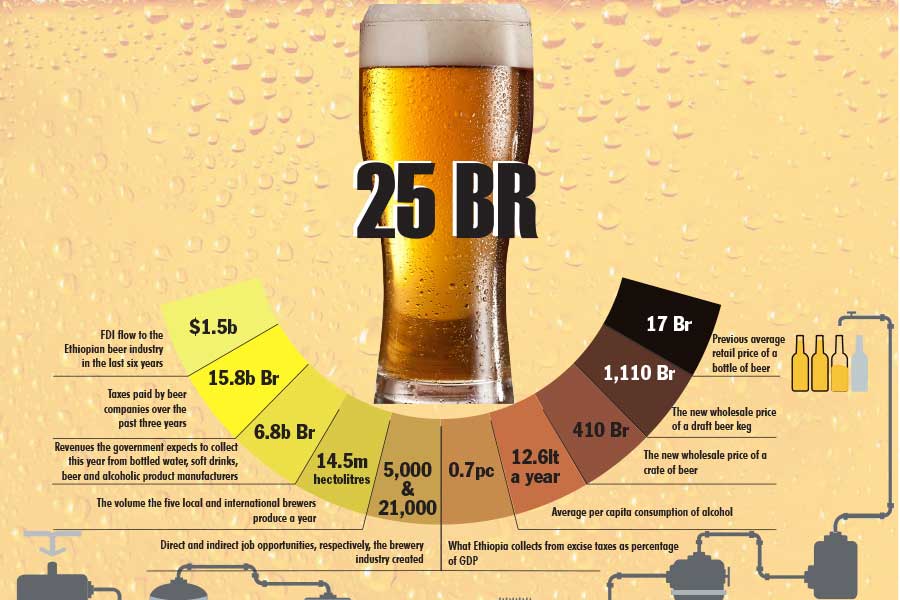
Commentaries | Nov 13,2021
Dec 5 , 2018
Each year, residents of Addis Abeba bow to Hidar Sitaten, an annual tradition of burning refuse. Given that plastic makes a substantial portion of the solid waste in Ethiopia today, this tradition may be doing more harm than good, writes Ambessaw Assegued (assegued@anfilo.com).
There could hardly be any debate that the morning commute of passengers in a minicab from Lage Tafo to Mexico Square can be a gruelling journey. The rattle of the old vehicles, the loud clamours, crowded seats, disarrayed and jam-packed pavements, congested traffics, mountains of trash strewn across the streets, and the billowing dust and smog that envelops everything and everyone tasks the limits of endurance of everyone, even of the most jaded travellers.
But on the morning of Wednesday, November 21, 2018, a peculiarly crisp and bright sunlight seems to enliven the city. A gentle breath pushes and keeps at bay the foul and postulant air that usually hangs overhead; the common piles of unsightly trash packed in dripping and soiled jute-bags are neatly stacked; and the typically grubby thoroughfares and murky public squares look scrubbed, racked and swept.
“Today is Hedar Sitaten,” says a woman in a sing-song voice addressing her companion in the back of the taxi.
She is nostalgically talking about Hedar Sitaten, smoked Hidar, the Ethiopian version of spring cleaning, when household rubbish and refuse are gathered and set alight each year on Hedar 12 of the Ethiopian Calendar, or November 21. Hedar Sitaten, is a custom that originates in a distant past, a century ago to be exact, when the deadly second wave of the Spanish Flu pandemic arrives in Ethiopia and causes devastations and ruins.
For a day or two before the Wednesday, street sweepers have temporarily abandoned their laissez-faire attitudes and have been assiduously working with unaccustomed zeal to sweep and remove the trash from the boulevards. In the days leading to Hedar Sitaten, shopkeepers and residents have been sweeping, cleaning and collecting garbage with uncommon fervour that they have momentarily rendered the shopfronts and streets into shiny and radiant cityscapes.
“Hedar Sitaten is both a commemoration and a public ritual to ward off future pandemics in the country, and its memories are etched in our collective narratives, folklores, and literature,” writes Yayehyirad Kitaw in a 2018 article published by the Ethiopian Journal of Health Development.
On this particular Wednesday, a rare occasion when the city sparkles and a gentle breath soothes and caresses the much-jostled travelers; there, where a group of passengers are sitting jam-packed in an idling taxi caught in a traffic jam; there, in what may pass for a tranquil moment for this collection of hardened commuters; there, intrudes an unnatural, pungent and acrid odour that suddenly drifts and fills the cabin air.
Before the taxi turns from the old Asmera Road to the junction between the light railway tracks and the ring road, out in the distant comes into view a dark bluish smoke that bellows from under the highway overpass. A group of young men are standing around and watching a mound of plastic waste and rubbish set on fire. As the men watch, the dark plume of smoke rises ferociously from the smoldering fire and being deflected by the concrete viaduct, the smoke disperses violently on both sides of the road enveloping everything in its wake.
The passengers steer a little, make some gestures and attempts to cover their mouths and noses, but otherwise register nary a discomfort or care as the poisonous haze of chemicals swamps the cabin and the toxic smoke penetrates their lungs and bodies.
This is the new Ethiopia where plastic waste covers the highway embankments, fills the open drains, lines the river beds and overwhelms the landscape from cities to the countryside. For Hedar Sitaten, we now set on fire mounds of plastic waste and trash that release unimaginable quantities of dangerous chemicals into the air.
A century ago Ethiopians can be assumed to have used no single-use polyethene terephthalate plastic bottles to drink water, wrap their meat portions in polypropylene bags, carry their staff in polyethene buckets, or eat their meals from melamine resin dishes. That could hardly be the case since plastics were first reported in the United States in 1907, and the industry only blossomed in the 1950s.
Today, plastics have found their way into our homes and workspaces in a myriad of articles that modern living has devised and planted. In the absence of proper waste collection in the city, plastic waste is often thrown into the fire - Jerry cans, bottles, bags, food containers, packing ties, tarps, styrofoam, fillings, wrappings, furnishings, beddings, toys, furniture and more are all fire fodders.
Given the scale and the apparent lack of information and awareness in Ethiopia about modern health issues, it is likely that most Ethiopians who burn their plastic waste do not realise the adverse health and environmental impacts of the practice. Incineration of plastic releases to the air dangerously toxic chemicals such as dioxin that can cause damages to the nervous system, kidneys, livers, reproductive and development systems. The burning of chemicals allows dangerous gases like styrene to easily be absorbed through the skin and lungs.
The problem of plastic waste accumulation both in the public spaces and households is exasperated by the municipal authorities who seem to have reached a de ad end in finding solutions to the critical waste disposal problem in the city, and indeed the country.
The city relies on antiquated methods of waste management and collection like using hand-pulled carts, handling of rubbish by municipal workers without protective gears, open-air dumping, street-side damp locations, using and re-using jute-bags to store and transport garbage and hauling wastes by trucks.
In a July 8, 2018, article published in the Ethiopian Herald, the typical swagger and solution of the authorities was in full display when an official of the former Ministry of Environment, Forest & Climate Change, Girma Gemechu said, “new regulation has been developed and awaiting to be ratified by the parliament. When the regulation is ratified, it is expected to alleviate the problems regarding plastic products [waste].”
We will have to wait and see, then.
PUBLISHED ON
Dec 05,2018 [ VOL
19 , NO
971]


Commentaries | Nov 13,2021

Fortune News | Feb 29,2020

Radar | May 21,2022

Advertorials | Sep 13,2021

Fortune News | Feb 19,2022

Editorial | Oct 02,2021

Sunday with Eden | Mar 27,2021

Fortune News | Apr 26,2019

My Opinion | Feb 12,2022

Radar | Aug 28,2021

Dec 22 , 2024 . By TIZITA SHEWAFERAW
Charged with transforming colossal state-owned enterprises into modern and competitiv...

Aug 18 , 2024 . By AKSAH ITALO
Although predictable Yonas Zerihun's job in the ride-hailing service is not immune to...

Jul 28 , 2024 . By TIZITA SHEWAFERAW
Unhabitual, perhaps too many, Samuel Gebreyohannes, 38, used to occasionally enjoy a couple of beers at breakfast. However, he recently swit...

Jul 13 , 2024 . By AKSAH ITALO
Investors who rely on tractors, trucks, and field vehicles for commuting, transporting commodities, and f...

Oct 18 , 2025
The political establishment, notably the ruling party and its top brass, has become p...

Oct 11 , 2025
Ladislas Farago, a roving Associated Press (AP) correspondent, arrived in Ethiopia in...

Oct 4 , 2025
Eyob Tekalegn (PhD) had been in the Governor's chair for only weeks when, on Septembe...

Sep 27 , 2025
Four years into an experiment with “shock therapy” in education, the national moo...